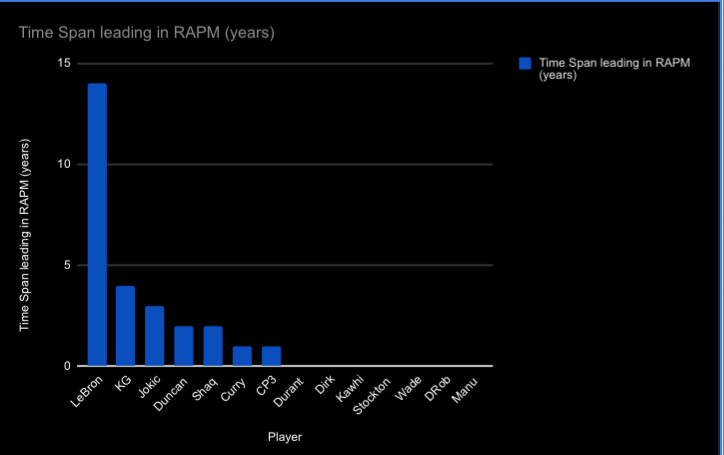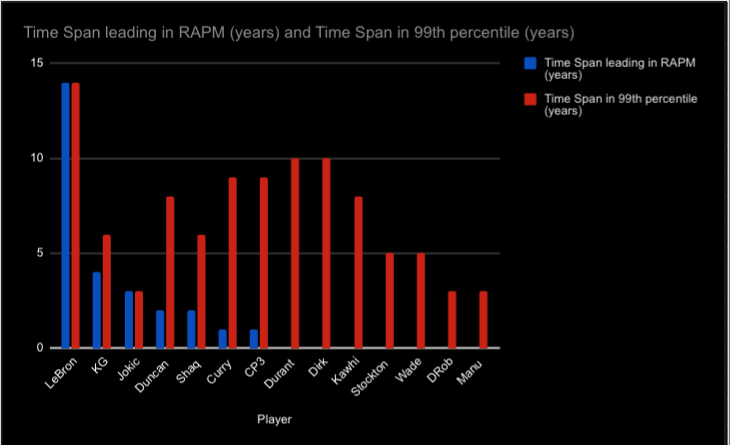MyUniBroDavis wrote:TheLand13 wrote:twyzted wrote:
Nahh it would be fairly easy to poke holes in many of these arguments for Lebron.
So do it then.
Half the general board can barely poke holes through paper lol
True.
Moderators: Doctor MJ, trex_8063, penbeast0, PaulieWal, Clyde Frazier



MyUniBroDavis wrote:TheLand13 wrote:twyzted wrote:
Nahh it would be fairly easy to poke holes in many of these arguments for Lebron.
So do it then.
Half the general board can barely poke holes through paper lol
ut this doesn't mean anything of itself. For the KD parallel to work, the Celtics need to be great(relative to the comp) without Russell. Nothing suggests this is true beyond the Celtics first few titles(i listed the different stuff in my previous post). Crucially everything we have suggests the opposite was true in 1969, and here the competition is far better than "not weak".
Assuming you are not trying to break era-relativity, here are 3-ways we can look at opposition strength
1. Look at how the teams look relative to the league for the era(bullets and knicks are outliers by srs, Lakers are close)
2. Look at how the comp was relative to the league that season(Celtics beat the best, 2nd best and 4th best opponent they could have had by SRS)
3. Look at how the comp was in surrounding seasons(Knicks SRS doubles en-route to a championship the following year, Bullets and Lakers srs drops but they take the Knicks to 7 and LA win a championship and make 3 finals)
By any of these approaches the Celtics faced an all-time difficult gauntlet and there is absolutely nothing to suggest the Celtics were some stacked super-squad. "Competition" is not a serious argument here. Bill went through just about the hardest possible route, with weak support, in a year where the best teams were unusually good. Not sure how that doesn't get him to a tier 1(era-relative) peak unless you arbitrarily decide to curve 1969 down to what feels reasonable without scaling the other title-winning years up.
George Mikan (1924) "Mr. Basketball", 6'10" center, the first true big man, 7 total pro titles with Chicago Gears & Lakers
Image
Origin: Illinois
College: DePaul
Series Wins: 23
All-League 1st Team: 8 times
Star-Prime: 8 seasons
POY wins: 8, POY shares: 8.0
OPOY wins: 3, OPOY shares: 3.8
DPOY wins: 6, DPOY shares: 6.2
The obvious top player from the era so maybe not a ton to be gleaned from going into further detail, but some observations:
- Mikan appears to have been the best offensive player in pro basketball basically from the time he turned pro. Eventually others arrive in the league to top him, but he remains elite until the rule change of 1951 that widened the key from 6 to 12 feet specifically to stop him. From that point onward, while Mikan likely remained the best rebounder in the world, it seems that the rule change did have the desired effect.
- Mikan almost certainly would have been an even more impactful defender from the jump if not for the banning of goaltending. As it was, it seems like it took Mikan some time to re-optimize his defensive play. He had a recurring issue of foul trouble that was often the Achilles heel for his teams win the lost.
- So far as I can tell, Mikan's defensive dominance in the NBA was less about shotblocking and more about rebounding. Certainly the shotblocking threat was there to a degree, but in a league with such weak shooting percentage, rebounding was arguably king.


lessthanjake wrote:Kyrie was extremely impactful without LeBron, and basically had zero impact whatsoever if LeBron was on the court.
lessthanjake wrote: By playing in a way that prevents Kyrie from getting much impact, LeBron ensures that controlling for Kyrie has limited effect…




homecourtloss wrote:Not sure if all have seen this, but Engelmann has been reworking his RPM models into what he now calls xRAPM (RS and PS), and for single year RAPM, LeBron leads in nine different seasons between 2007 and 2021, a 14 year span of years leading in RAPM. To say this ludicrous is an understatement. In the databall era, i.e., 1997-current, there have only been a handful of players who have led a season in RAPM multiple years and the longest span of years between leading in RAPM other than LeBron’s 14 is KG’s 4. LeBron was in 99th percentile in every season between 2007 and 2021 save 2019.
If you look at being in the 99th percentile rather than outright leading, then you get some longer spans such as Dirk’s 10 and KD’s 10. KD is interesting since he appears in the 99th percentile in 2013 and 2014 and then again in 2022 and 2023.
https://xrapm.com/table_pages/xRAPM_hist.html
The breadth of longevity and peak impact is quite extraordinary.Spoiler:
falcolombardi wrote:homecourtloss wrote:Not sure if all have seen this, but Engelmann has been reworking his RPM models into what he now calls xRAPM (RS and PS), and for single year RAPM, LeBron leads in nine different seasons between 2007 and 2021, a 14 year span of years leading in RAPM. To say this ludicrous is an understatement. In the databall era, i.e., 1997-current, there have only been a handful of players who have led a season in RAPM multiple years and the longest span of years between leading in RAPM other than LeBron’s 14 is KG’s 4. LeBron was in 99th percentile in every season between 2007 and 2021 save 2019.
If you look at being in the 99th percentile rather than outright leading, then you get some longer spans such as Dirk’s 10 and KD’s 10. KD is interesting since he appears in the 99th percentile in 2013 and 2014 and then again in 2022 and 2023.
https://xrapm.com/table_pages/xRAPM_hist.html
The breadth of longevity and peak impact is quite extraordinary.Spoiler:
He is so very clearly the most valuable player of the 21th century is not even fun, and did it going from the late deadball era all the way to the small ball shoting era to boot
lessthanjake wrote:Kyrie was extremely impactful without LeBron, and basically had zero impact whatsoever if LeBron was on the court.
lessthanjake wrote: By playing in a way that prevents Kyrie from getting much impact, LeBron ensures that controlling for Kyrie has limited effect…




homecourtloss wrote:falcolombardi wrote:homecourtloss wrote:Not sure if all have seen this, but Engelmann has been reworking his RPM models into what he now calls xRAPM (RS and PS), and for single year RAPM, LeBron leads in nine different seasons between 2007 and 2021, a 14 year span of years leading in RAPM. To say this ludicrous is an understatement. In the databall era, i.e., 1997-current, there have only been a handful of players who have led a season in RAPM multiple years and the longest span of years between leading in RAPM other than LeBron’s 14 is KG’s 4. LeBron was in 99th percentile in every season between 2007 and 2021 save 2019.
If you look at being in the 99th percentile rather than outright leading, then you get some longer spans such as Dirk’s 10 and KD’s 10. KD is interesting since he appears in the 99th percentile in 2013 and 2014 and then again in 2022 and 2023.
https://xrapm.com/table_pages/xRAPM_hist.html
The breadth of longevity and peak impact is quite extraordinary.Spoiler:
He is so very clearly the most valuable player of the 21th century is not even fun, and did it going from the late deadball era all the way to the small ball shoting era to boot
Simply being in the 99 percentile in 2007 and then in the 99 percentile in 2021 let alone leading in both years in a completely different environment is really beyond anything. If you look at the entire data set, all of these players I mentioned are outliers, but amongst just these players, LeBron is an outlier amongst outliers.
To match this 14 year band, someone like Jokić would have to be leading RAPM in a season in 2036.
If Jordan lead in 1988 then he would have to lead in 2002 to match the same span.
Over the past few years, for obvious reasons, the term "longevity" has been sometimes switched out for the phrase "just played a really long time" and it does a disservice to those players that can be impactful for such a long period of time let alone be the most impactful player over such a long period of time. Because the game changes in micro evolves, either your skill set has to evolve and/or your skill set is so dominant that regardless of era and environment you're still that impactful, e.g., Kareem.





homecourtloss wrote:Over the past few years, for obvious reasons, the term "longevity" has been sometimes switched out for the phrase "just played a really long time" and it does a disservice to those players that can be impactful for such a long period of time let alone be the most impactful player over such a long period of time. Because the game changes in micro evolves, either your skill set has to evolve and/or your skill set is so dominant that regardless of era and environment you're still that impactful, e.g., Kareem.




penbeast0 wrote:His athleticism didn't fade that much plus the league's requirements for PFs moved away toward his strengths. Credit his amazing conditioning.


falcolombardi wrote:penbeast0 wrote:His athleticism didn't fade that much plus the league's requirements for PFs moved away toward his strengths. Credit his amazing conditioning.
His athletism is absolutely nothingh compared to what it was just before lakers, let alone before miami
Current lebron has solid speed and lift in straight lines but not much more, and not comparable at all to his prime, is why he basically doesmt have a half court driving game anymore
He is paedestrian compared ro even 2022 lebron athletism who was a lethal cutter and roll-man, let alone 2018-2020 lebron who was still a off the dribble threat, let alone before that
falcolombardi wrote:homecourtloss wrote:falcolombardi wrote:
He is so very clearly the most valuable player of the 21th century is not even fun, and did it going from the late deadball era all the way to the small ball shoting era to boot
Simply being in the 99 percentile in 2007 and then in the 99 percentile in 2021 let alone leading in both years in a completely different environment is really beyond anything. If you look at the entire data set, all of these players I mentioned are outliers, but amongst just these players, LeBron is an outlier amongst outliers.
To match this 14 year band, someone like Jokić would have to be leading RAPM in a season in 2036.
If Jordan lead in 1988 then he would have to lead in 2002 to match the same span.
Over the past few years, for obvious reasons, the term "longevity" has been sometimes switched out for the phrase "just played a really long time" and it does a disservice to those players that can be impactful for such a long period of time let alone be the most impactful player over such a long period of time. Because the game changes in micro evolves, either your skill set has to evolve and/or your skill set is so dominant that regardless of era and environment you're still that impactful, e.g., Kareem.
The agenda against longevity as if being good at late and early ages didnt correlate so so strongly with beinh good at peak age too
In any other context we used to look at guys who were dominant before or past their prime and wonder how good they must have been at their best but it got phased out
Funnily enough it used to be somethingh held against lebron, everyone was so sure he would age badly due to "lack of talent" (lack of shooting long's 2's off curls maybe) once his athletism faded